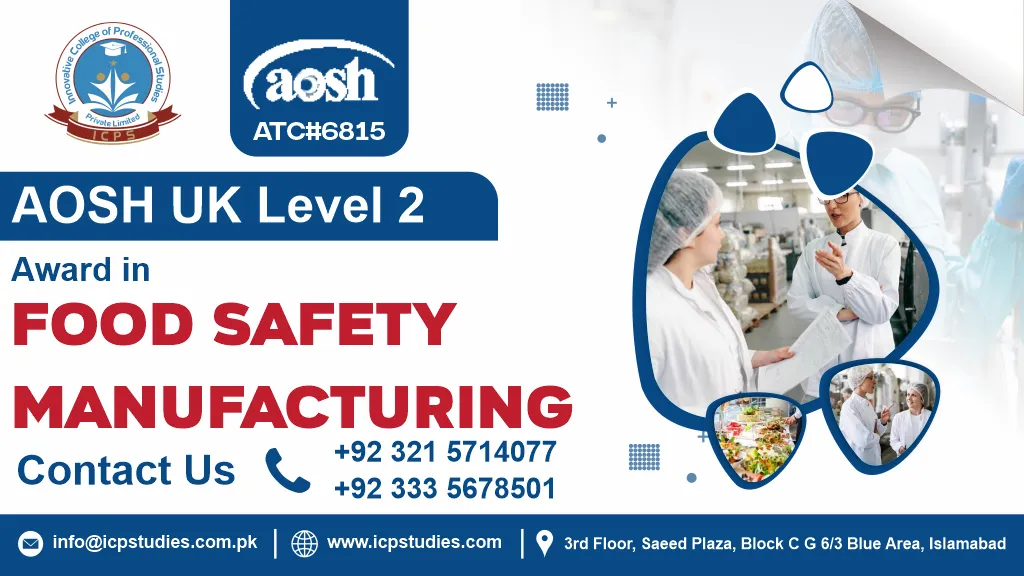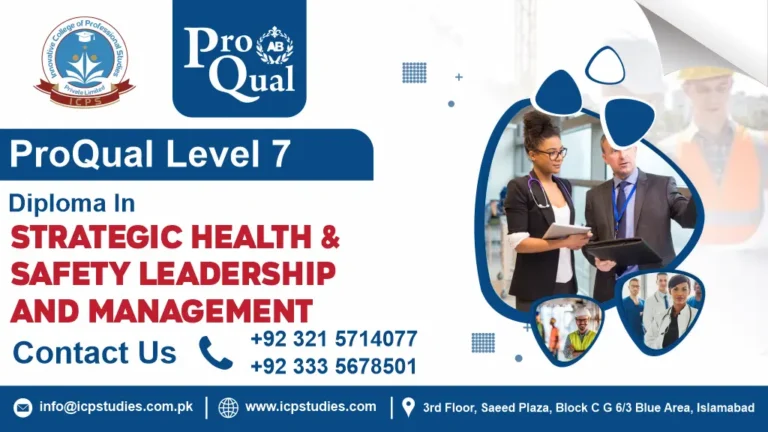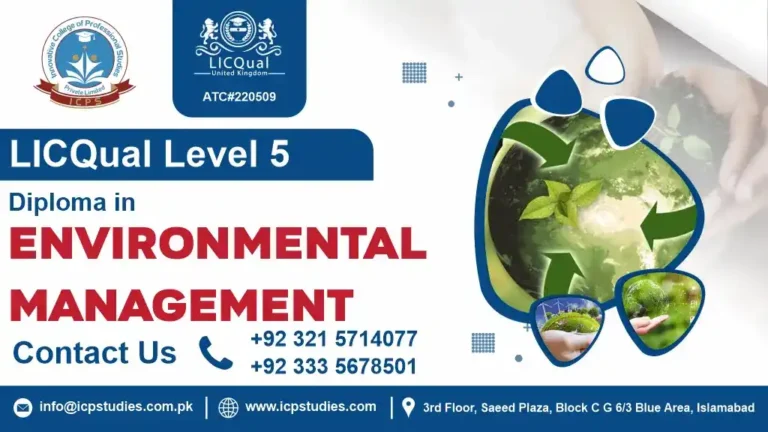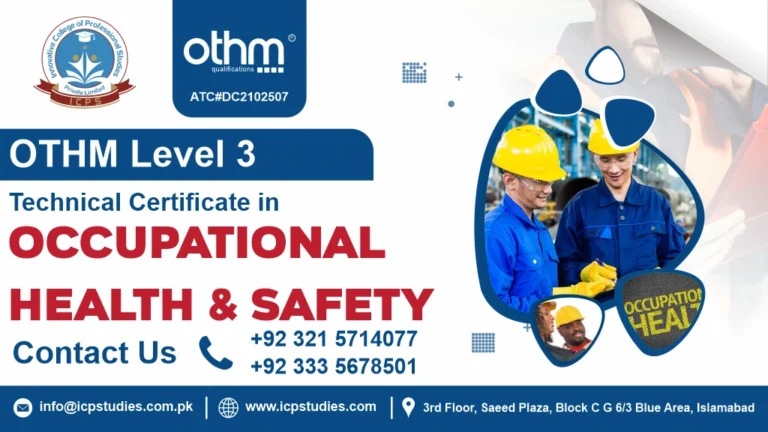Welcome to the dynamic realm of food manufacturing, where precision and safety dance together, creating an environment ripe for excellence. We’re thrilled to announce that the gates are wide open for enrollment in the AOSH UK Level 2 Award in Food Safety Manufacturing—an exceptional program designed to catapult your career to unprecedented heights while upholding the utmost standards of safety in the intricate landscape of food production.
In the intricate dance of food manufacturing, precision and safety are the choreographers, and the AOSH UK Level 2 Award is your backstage pass to mastery. This transformative program isn’t just a certification; it’s a golden opportunity for those who aspire to excellence in the world of food production.
The doors are ajar, inviting individuals who aspire for excellence to embark on a journey of skill enhancement and career advancement. The AOSH UK Level 2 Award isn’t merely a course; it’s a transformative experience tailored to empower you with the knowledge and skills required to navigate the intricacies of food production with finesse.
As you journey through this program, envision the global recognition that accompanies the AOSH UK Level 2 Award—a testament to your commitment to safety and quality. This isn’t just about personal development; it’s about making a local impact by contributing to a manufacturing landscape that prioritizes safety in every step of the process.
Bid farewell to conventional learning—this program is an immersive experience that goes beyond theory. Picture interactive sessions, real-world scenarios, and practical insights shaping your understanding of food safety. The AOSH UK Level 2 Award ensures that you not only comprehend theoretical concepts but also gain the confidence to apply them effectively in the manufacturing arena.
Why wait when a transformative journey awaits? The AOSH UK Level 2 Award in Food Safety Manufacturing is your opportunity to shine in a field where precision and safety define success. Enroll now to acquire practical skills, elevate your career, and contribute to a resilient and safety-conscious food manufacturing industry. The future of food safety is within reach—step through the open doors and seize your golden opportunity!
All About AOSH UK Level 2 Award in Food Safety Manufacturing
Course Overview
Embark on a culinary revolution with the AOSH UK Level 2 Award in Food Safety Retail—a transformative journey that reshapes the fabric of retail excellence. This certification transcends mere skill acknowledgment; it’s your golden ticket to revolutionize the culinary landscape within the dynamic realm of retail.
Crafted for a world where culinary mastery and customer satisfaction intersect, this program breaks free from conventional training. It propels retail professionals into a realm where they not only meet but exceed expectations, establishing unprecedented benchmarks in food safety.
Envision an immersive learning experience that transcends the mundane, guiding you through the intricacies of retail excellence. The AOSH UK Level 2 Award empowers retail professionals with the tools to elevate their craft, navigate challenges, and set unparalleled standards in food safety.
More than a certification, it’s a commitment to transform every aisle into a showcase of culinary brilliance and safety mastery. This program isn’t about settling for the ordinary; it’s about redefining possibilities in the retail culinary landscape. Imagine shelves adorned not just with products but with a dedication to the highest safety standards—a pledge to delight taste buds while ensuring unwavering food safety.
In this transformative journey, retail professionals become pioneers, setting the stage for a future where every interaction, every product, reflects their dedication to excellence. The AOSH UK Level 2 Award in Food Safety Retail isn’t just a qualification; it’s an invitation to embark on a culinary adventure that reshapes the retail narrative. Elevate your expertise, exceed expectations, and lead a retail revolution championing culinary brilliance and impeccable food safety.
Learning Outcomes
- Comprehensive Understanding of Food Safety Regulations: Gain a thorough knowledge of food safety regulations and guidelines specific to the retail industry, ensuring compliance with local and international standards.
- Identification and Mitigation of Food Safety Hazards: Develop the skills to identify potential food safety hazards in a retail environment and implement effective measures to mitigate risks throughout the entire food handling and production process.
- Application of HACCP Principles in Retail Settings: Acquire expertise in applying Hazard Analysis and Critical Control Points (HACCP) principles within the unique context of retail, fostering a proactive approach to food safety.
- Hands-On Implementation of Safe Food Handling Practices: Learn and demonstrate practical, hands-on techniques for safe food handling, storage, and preparation, ensuring the highest standards of hygiene and safety in a retail setting.
- Effective Pest Control Measures: Understand and implement effective pest control measures relevant to the retail environment, minimizing the risk of contamination and ensuring the integrity of food products.
- Creation and Maintenance of a Food Safety Management System: Develop the skills to create, implement, and maintain a robust Food Safety Management System (FSMS) tailored for the retail sector, emphasizing continuous improvement and adherence to best practices.
- Customer Communication and Education on Food Safety: Enhance communication skills to effectively convey food safety information to customers, promoting transparency and building trust in the safety and quality of retail food products.
- Emergency Preparedness and Response: Acquire knowledge and skills related to emergency preparedness and response in the event of food safety incidents, ensuring a swift and effective resolution to protect public health.
- Continuous Improvement and Adaptation to Industry Changes: Develop a mindset of continuous improvement, staying abreast of industry changes and emerging trends in food safety to adapt practices and maintain the highest standards.
- Global Recognition and Professionalism: Understand the global significance of the AOSH UK Level 2 Award and embody the highest levels of professionalism, recognizing the impact of individual actions on the broader reputation of the retail establishment.
Admission Criteria
- Educational Qualifications: Prospective candidates may need to meet certain educational qualifications, often at a level that demonstrates a basic understanding of the principles relevant to food safety in manufacturing. This could include a minimum level of education, such as a high school diploma or its equivalent.
- Work Experience: While not always mandatory, having relevant work experience in the food manufacturing industry can be advantageous. Individuals with hands-on experience in food production, handling, or processing may find the program more aligned with their professional background.
- Language Proficiency: Proficiency in the language of instruction (usually English) may be a requirement. This ensures that candidates can effectively comprehend and engage with the course materials, assessments, and participate in discussions.
- Age Requirements: Some programs may have specific age requirements for admission. Candidates are typically required to be of a certain age to enroll in the program.
Ideal Candidate
- Relevant Industry Background: The ideal candidate may have a background in the food manufacturing industry or related fields. This includes individuals involved in the production, processing, or handling of food within a manufacturing setting.
- Commitment to Food Safety: A commitment to ensuring the safety and hygiene of food products is crucial. The ideal candidate recognizes the importance of adhering to food safety regulations and practices to guarantee the well-being of consumers.
- Attention to Detail: Given the precision required in food manufacturing, the ideal candidate pays meticulous attention to detail. This includes being thorough in assessing potential hazards, implementing safety measures, and ensuring compliance with hygiene standards.
- Team Player: In a manufacturing environment, collaboration and effective communication are essential. The ideal candidate works well within a team, understanding the collective responsibility to maintain food safety standards.
- Desire for Professional Development: The ideal candidate is motivated to enhance their knowledge and skills in food safety. Whether already employed in the manufacturing sector or aspiring to enter this field, the candidate sees the Level 2 Award as a valuable opportunity for professional development.
- Adaptability: Food manufacturing environments may involve various processes and technologies. The ideal candidate is adaptable and open to learning new methodologies and technologies related to food safety in a manufacturing context.
- Compliance Awareness: An awareness of regulatory requirements and compliance standards related to food safety is essential. The ideal candidate understands the importance of following local and international regulations governing food manufacturing.
- Communication Skills: Effective communication is key, especially when conveying food safety protocols to team members. The ideal candidate can articulate and share information clearly, contributing to a culture of safety within the manufacturing setting.
- Problem-Solving Aptitude: Challenges related to food safety may arise in manufacturing. The ideal candidate possesses problem-solving skills, being able to address issues promptly and proactively to maintain the integrity of food safety measures.
- Aspiring Supervisors or Managers: While not a strict requirement, individuals aspiring to supervisory or management roles in food manufacturing will find the Level 2 Award beneficial. The program lays the foundation for understanding and implementing food safety practices at various levels of responsibility.
Key Takeaways
Study Units
- Introduction to Food Safety: This unit lays the foundation by introducing participants to the fundamental concepts of food safety. It covers the importance of maintaining high standards and the potential risks associated with inadequate food safety practices in manufacturing.
- Microbiological Hazards in Food Manufacturing: Participants delve into the world of microbiological hazards, learning about the types of microorganisms that can affect food safety in the manufacturing process. This unit explores the risks and preventive measures to control microbiological contamination.
- Contamination Hazards and Controls: This unit focuses on various contamination hazards that can arise during food manufacturing and the corresponding control measures. Participants gain insights into preventing physical, chemical, and biological contamination to ensure product safety.
- HACCP (Hazard Analysis and Critical Control Points): HACCP is a critical aspect of food safety management. This unit provides an in-depth understanding of the HACCP system, guiding participants through the identification, analysis, and control of critical points in the manufacturing process.
- Food Safety Management Systems: Participants explore different food safety management systems and their application in the manufacturing setting. This unit covers the principles and practices of effective food safety management to maintain compliance with industry standards.
- Personal Hygiene in the Manufacturing Environment: Emphasizing the importance of personal hygiene, this unit educates participants on best practices for maintaining cleanliness and preventing contamination at a personal level within the manufacturing environment.
- Food Safety Hazards and Risks in Manufacturing: This unit provides a comprehensive overview of various food safety hazards and risks specific to the manufacturing sector. Participants learn to identify potential hazards and assess associated risks to develop proactive mitigation strategies.
- Cleaning and Disinfection in Manufacturing: Maintaining a clean and sanitary manufacturing environment is crucial for food safety. This unit covers effective cleaning and disinfection practices, ensuring participants understand the importance of hygiene in preventing contamination.
- Food Safety Legislation and Enforcement: Participants gain knowledge about relevant food safety legislation and enforcement mechanisms. This unit helps individuals understand their legal responsibilities and obligations within the regulatory framework governing food safety in manufacturing.
- Communication and Training in Food Safety: Effective communication and training are essential components of a robust food safety culture. This unit explores strategies for promoting clear communication and providing adequate training to staff involved in the manufacturing process.
FAQs for AOSH UK Level 2 Award in Food Safety Manufacturing







